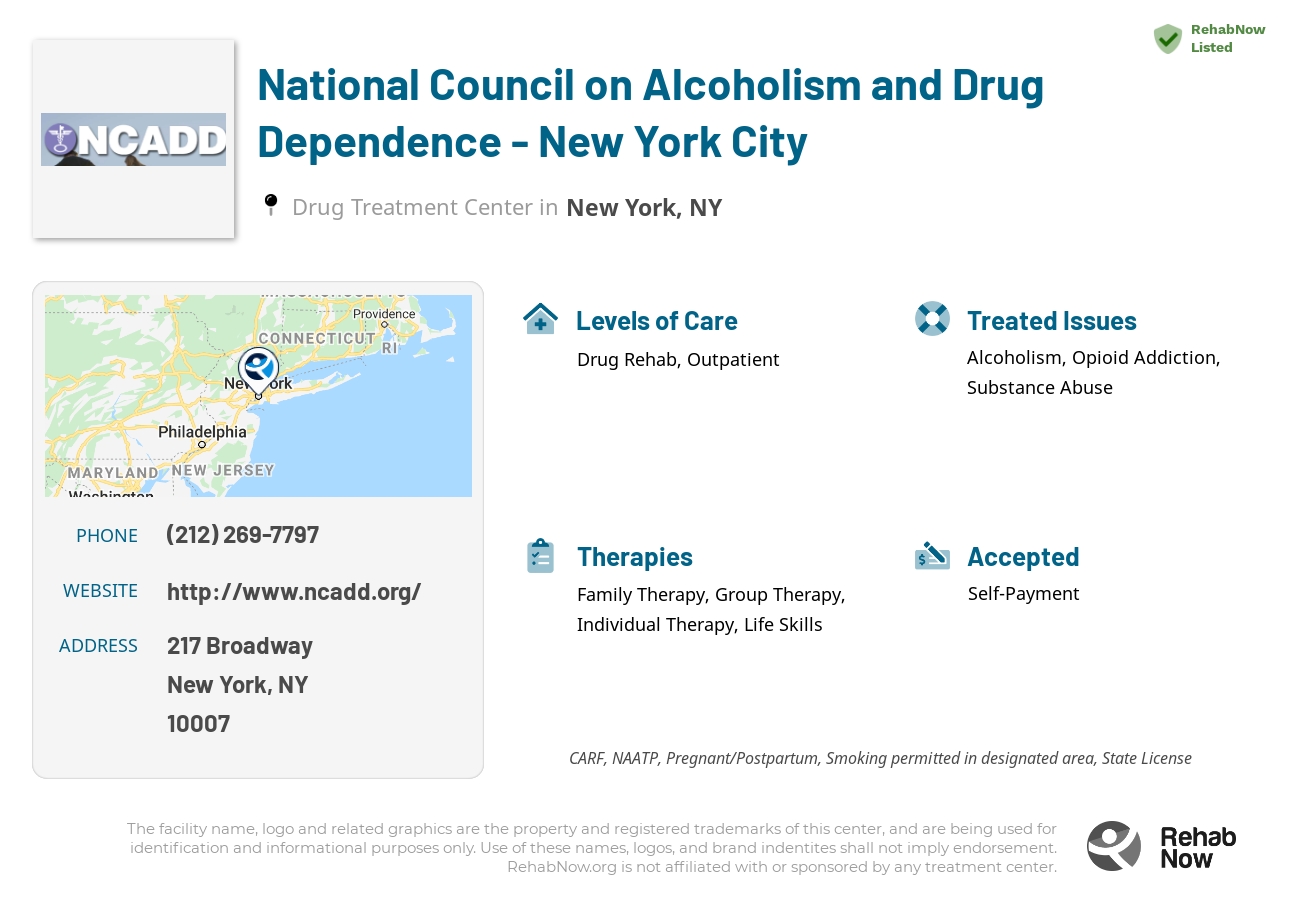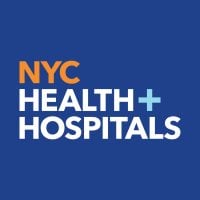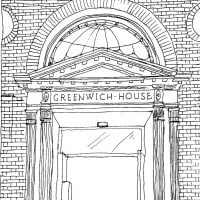National Council on Alcoholism and Drug Dependence - New York City
Drug Rehab Center in New York, New York
The National Council on Alcoholism and Drug Dependence - New York City provides comprehensive levels of care for those looking to overcome addiction, including drug rehab, outpatient care, inpatient care, aftercare support, detoxification programs and partial-hospitalization services that are accredited by SAMHSA and can be covered by most forms of private health insurance.
About This New York, NY Facility
National Council on Alcoholism and Drug Dependence - New York City is a Addiction Treatment Facility located in New York, NY. It specializes in treating individuals suffering from Alcoholism, Opioid Addiction, Substance Abuse, Eating Disorder, Dual Diagnosis, and Drug Addiction. They provide a variety of treatment options including drug rehab, outpatient, inpatient, aftercare support, detox, and partial-hospitalization levels of care. NCADD-NYC is accredited by SAMHSA and accepts private health insurance. It is also affiliated with Recovered, a recovery-oriented platform that provides information and resources for people seeking help and their families.
NCADD-NYC offers comprehensive treatment plans tailored to the individual needs of the patient to ensure that they are receiving the best possible treatment. These plans incorporate evidence-based therapeutic modalities such as Cognitive Behavioral Therapy, Dialectical Behavioral Therapy, Trauma Focused Therapy, and more. In addition, NCADD-NYC provides support services such as relapse prevention, individual and group therapy, co-occurring disorder and nutrition counseling. It also provides services such as job readiness training and aftercare support to help individuals transition back into the community and succeed in their recovery journey.
Genders
Ages
Modality
Additional
Accreditations
SAMHSA
Conditions and Issues Treated
Rehab centers exist in New York, NY to help individuals bounce back from substance abuse, which is an umbrella term for drug and alcohol addiction. Drug addiction refers to the use of illegal drugs and improper use of prescription drugs. Centers like National Council on Alcoholism and Drug Dependence - New York City provide individuals a chance to access individual and group therapy that can be monumental for recovery.
Substance abuse includes all problems that stem out from using various psychoactive substances. It is also a diagnostic term used by Diagnostic and Statistical Manual of Mental Disorders (DSM-IV) to define the mental and physical impairment or distress caused by misuse and overuse of certain substances in a period of 12 months.
Opioid addiction involves addiction to legal or illegal opioids. It may happen very quickly with any opioid use. Sometimes within a matter of days. Opioid addiction is a known as a high-risk factor for future heroin addiction.
Opioid withdrawal can be extremely uncomfortable and lead the user to continue to use even if they want to quit. Stopping using an opioid requires careful medical observation. Sometimes the withdrawal can persist for many weeks, which can put the user at a high risk for relapse.
It is recommended to receive inpatient treatment and a medically supervised detox like those offered at National Council on Alcoholism and Drug Dependence - New York City in New York, NY, NY, to manage the withdrawal process while learning lasting tools to maintain recovery. In some circumstances medications can be used to manage opioid addiction.
Levels of Care Offered
This center offers a variety of custom treatment tailored to individual recovery. Currently available are Aftercare Support, Detox, Drug Rehab, Inpatient, Outpatient, Partial-Hospitalization, with additional therapies available as listed below.
Detox is the first step of rehab. It involves giving a person time to get the toxins out of their body. During detox, the patient gets ill, and they will often start using again to get rid of these unpleasant feelings. That’s why it’s important to have a medical professional at National Council on Alcoholism and Drug Dependence - New York City present. A medical professional will make sure patients don’t start using during detox. They will also likely provide medication to ease their symptoms and coach them through on a mental level.
Inpatient rehab programs like what’s offered at National Council on Alcoholism and Drug Dependence - New York City in New York, NY are ideal for covering all the bases that surround one’s addiction. It’s considered the most comprehensive approach to care for people afflicted with addiction. Patients live in a facility where they have access to therapy and medical care 24/7.
Outpatient treatment is treatment that occurs when a patient is not checked into a rehab facility. The patient may show up for therapy sessions, go through detox and engage in other therapies to help them recover. However, they will do so while they live at home in New York.
Outpatient therapy provided by National Council on Alcoholism and Drug Dependence - New York City is usually recommended as a follow up to inpatient therapy. It helps patients adapt to their normal lives after treatment. In some cases, it can also be an alternative to inpatient treatment. People may choose this route if they are unable to leave their jobs, children or if they don’t have the money for inpatient treatment. However, inpatient treatment is the best way to recover from addiction.
National Council on Alcoholism and Drug Dependence - New York City‘s Partial Hospitalization Program is a midway point between inpatient and outpatient treatment. It is for people who are still struggling with addiction but don’t need round the clock care in New York. Patients may spend anywhere from 18 to 30 hours a week in a treatment program, but they will sleep at home. The duration of the program can be anywhere from one to six months.
Aftercare support involves the support given to a New York, New York patient after they complete treatment. It helps them adjust to normal life. It may include setting them up in a halfway house and enrolling them in programs like Narcotics Anonymous (NA) and Alcoholics Anonymous (AA). National Council on Alcoholism and Drug Dependence - New York City‘s patients may also be provided with career training to help them get back into the job force.
National Council on Alcoholism and Drug Dependence - New York City‘s Therapies & Programs
Individual therapy aims to identify the core issues that would have led the patient to substance abuse and address the root cause effectively. Patients find the therapist as a person who they can trust. It helps them to open up and discuss personal and sensitive issues, which they may not be comfortable discussing in a group.
Couples therapy is an approach wherein the patients and their partners are engaged together as a part of the treatment process. When a person becomes a victim of substance abuse, it affects the patient and the people around him, particularly his partner. Their relationship can become strained due to lack of communication, financial issues, loss of trust, lack of intimacy, and physical abuse in more severe cases.
Couples therapy addresses these issues and tries to rebuild the trust between the partners. The partner’s involvement in the process will result in greater chances of treatment success and sustained recovery.
Family therapy is a set of therapeutic approaches that assumes that the entire family is a system. It utilizes the strengths and resources of the family to help the patient refrain from resorting to substance abuse. It helps to repair relationships and improve communication between family members.
Group therapy happens at National Council on Alcoholism and Drug Dependence - New York City in a controlled group environment, as opposed to a one-on-one setting. It supports New York, NY patients’ recovery by offering a sense of comfort and letting them know that they are not alone. Through shared conversations, patients also learn to develop faith and understanding and gain insight on their addictions.
Unresolved trauma is often a key reason why many patients resorted to substance abuse. Trauma therapy refers to treatment wherein specialist therapists help the patients to resolve the trauma that led the patients to substance abuse. The trauma could be physical abuse, sexual abuse, war, natural disasters, divorce, accident, loss of a loved one, etc. Thinking of these traumatic events causes emotional disturbances like anxiety, depression and results in addiction. If trauma is the primary cause of substance abuse, then both issues must be addressed. Otherwise, there is a risk of relapse. Trauma therapy also improves the cognitive functions and provides long term benefits.
Cognitive behavioral therapy (CBT) is a way of addressing concerns through talking. It can be used in individual counseling sessions. Talking through issues with professionals at National Council on Alcoholism and Drug Dependence - New York City can identify sources of discomfort or unhealthy thoughts. It is a way of learning about yourself and your individual perceptions. CBT is a healthy way of addressing some behaviors which may be bringing unintended consequences in your life.
Patient Experience
Equine Therapy at National Council on Alcoholism and Drug Dependence - New York City
Equine therapy, or Equine-assisted therapy (EAT), uses horses in experiential therapy to help clients develop self-confidence and develop emotional awareness. Clients at National Council on Alcoholism and Drug Dependence - New York City in New York may feed and groom horses while processing their thoughts and feelings with a mental healthcare professional. Equine therapy is notably effective for people with anxiety disorders.Payment Options Accepted
For specific insurance or payment methods please contact us.
Is your insurance accepted?
Ask an expert, call (888) 674-0062
Recovered Associated Centers
Discover treatment facilities under the same provider.
- National Council on Alcoholism and Drug Dependence - White Plains in White Plains, NY
- National Council on Alcoholism and Drug Dependence - Carmel in Carmel, NY
Learn More About Recovered Centers
Additional Details
Specifics, location, and helpful extra information.
New York, New York 10007 Phone Number(212) 269-7797 Meta DetailsUpdated November 25, 2023
Staff Verified
What else do people call National Council on Alcoholism and Drug Dependence – New York City?
People have occasionally also searched for “National Council on Alcoholism and Drug Dependence in New York”
Patient Reviews
There are no reviews yet. Be the first one to write one.
New York, New York Addiction Information
More than 2 million New Yorkers are currently suffering from some type of substance abuse and many of those are minors. Alcohol abuse, in particular, is prevalent among those underage. As a result of the high prices and regulation of prescription drugs, many New Yorkers turn to heroin instead. This has led to a serious heroin epidemic in the state.
According to recent statistics, over 280,000 people in the state struggle with drug addiction. This accounts for approximately 8% of the population. In 2011, there were 1,532 deaths related to cocaine overdose in New York City. Currently, in New York City, there are over 3,000 people addicted to heroin and 1,700 addicted to cocaine. Most treatment plans offered in the area will involve some combination of detoxification, counseling, and medication.
Treatment in Nearby Cities
- Nyack, NY (26.6 mi.)
- Fresh Meadows, NY (12.1 mi.)
- Hudson Falls, NY (180.4 mi.)
- East Amherst, NY (289.4 mi.)
- Clifton Park, NY (147.9 mi.)
Centers near National Council on Alcoholism and Drug Dependence - New York City
The facility name, logo and brand are the property and registered trademarks of National Council on Alcoholism and Drug Dependence - New York City, and are being used for identification and informational purposes only. Use of these names, logos and brands shall not imply endorsement. RehabNow.org is not affiliated with or sponsored by National Council on Alcoholism and Drug Dependence - New York City.








